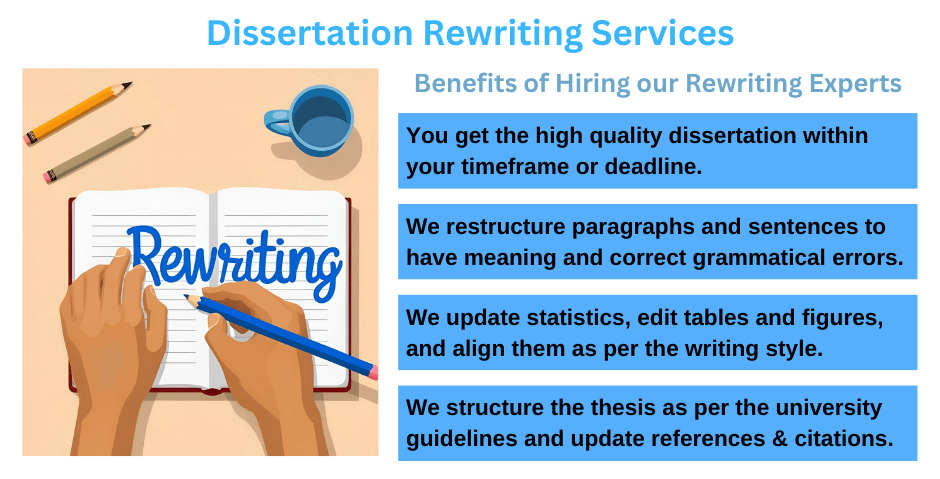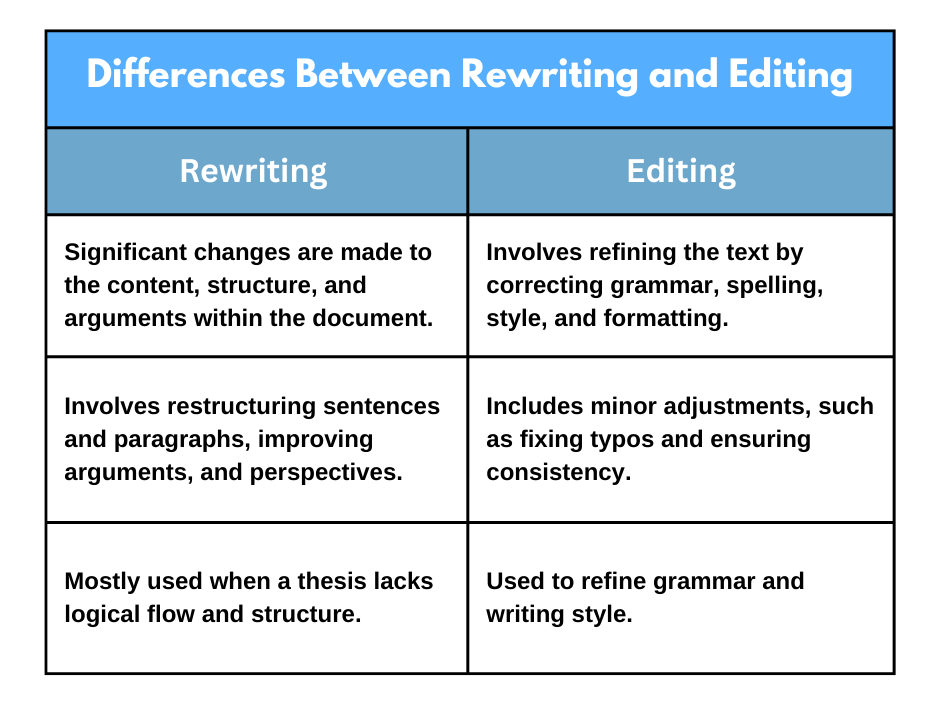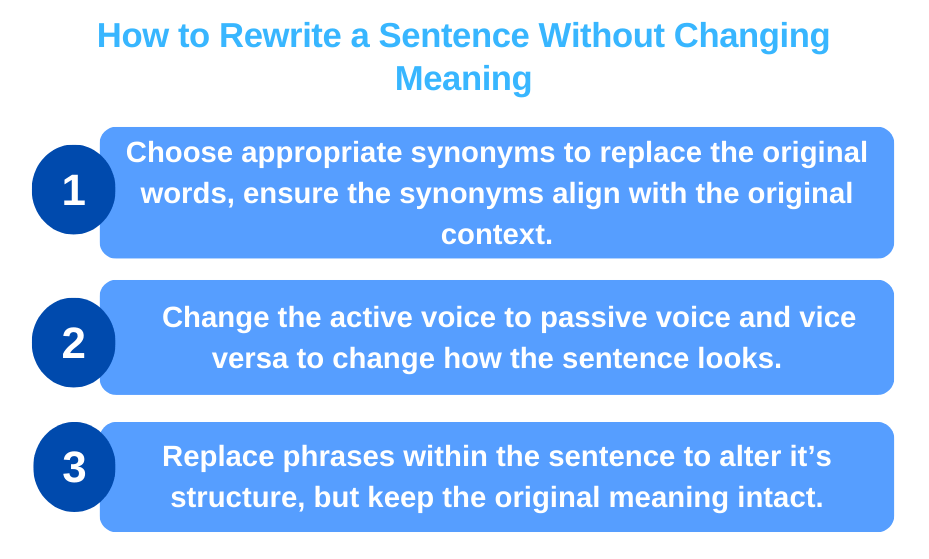Factors to Consider when Rewriting a Thesis or Dissertation
Rewriting a thesis involves reading through it to make corrections suggested by the supervisor, to get rid of plagiarism, to refine the format and flow of ideas, and present the results in a simpler and understandable manner. The process requires one to have in mind the reasons for rewriting and the type of changes needed in the document. Implementation of the suggested changes should not affect the overall structure, cohesion, and coherence of the entire document. In this article, we cover the importance of rewriting a thesis, the factors to consider when rewriting, and the common mistakes to avoid when rewriting a thesis.
We also have thesis rewriting experts for hire in case you do not have time or expertise to rewrite your thesis to perfection. Should you decide to use our thesis rewriting services, you will get a professional thesis writer to review your thesis, a data analyst (quantitative and qualitative expert), and an editor to ensure the final copy is flawless and outstanding.
The Importance of Rewriting a Thesis
The main purpose of rewriting a thesis is to:
- Clarify the document for the reader.
- Correct errors pointed out by one’s supervisor.
- Do away with plagiarism.
- Give one an opportunity to restructure and enhance course of information in the document, making it easier for the reader to keep track of, and understand the argument.
- Eliminate redundancies and repetition.
- Add more, or delete irrelevant information.
Steps to Make Thesis Rewriting Easier and Effective.
- One should first get a clear understanding of their thesis, and mark the areas that needs to be rewritten. They should be able to set their work aside for a while, then read it from a reader’s perspective to get a clear view of any mistakes, errors, or wrong choice of words.
- The scholar should then recreate the outline of their document. This can be attained through reading the document again while taking notes. If one is rewriting to correct errors pointed out in the supervisor’s comments, they should note down where such errors appear within the thesis and focus on them.
- It is important to make own checklist and revise it for the thesis. This will act as their rewriting guide to fix any problems that might be available in the document.
- After the checklist, one can write the final copy of their thesis while considering their notes, or supervisor’s comments, and correcting any other errors from the previous draft to make the it the best and of higher quality than before.
- The final copy of the dissertation should then be submitted to the supervisor, or the relevant person for further guidance.
Factors to Consider when Rewriting a Thesis
The following are some of the factors that one should consider when rewriting a dissertation.
1. Supervisor’s Comments
After the scholar has submitted their thesis or dissertation, the supervisor may point out errors in the document, or some sections which are contrary to the provided guidelines. One should rewrite to make corrections based on these comments, with the aim of improving the quality and readability of the document.
2. Level of Plagiarism
The first draft of the dissertation or thesis may have some plagiarism. One should make the dissertation free of plagiarism by keeping track of sources from which they got information when writing the thesis, paraphrasing and rewording, adding own ideas, and giving credit to the original authors of the reference material.
3. Purpose of Rewriting the Thesis
Rewriting a thesis aims at clarifying it for the target audience to understand it better, to correct errors, or to refine it to the best that it can be. Before starting off the rewriting process, one must understand why they are doing it. During the rewriting process one may be required to delete some paragraphs, reform, and rearrange others, but must be keen not to change the original purpose of the thesis.
4. Target audience
In rewriting a thesis, one must have the reader in mind, and use a language that is appropriate. The scholar should stick to the main idea of the document and find ways through which the idea can be communicated clearly and efficiently without confusing the reader with unnecessary pieces of information, other than the ones their thesis promises to address.
5. Maintenance and Originality
In order to achieve the objectives of rewriting, the scholar must strive to maintain the original idea of the thesis. Proofreading for continuity and logical progression is an excellent way to keep one on track. The beginning and the end of a thesis should relate to the main idea of the document.
6. Flow of Ideas
One should ensure there is proper transition between paragraphs. The ideas should flow coherently in a manner that the reader can easily comprehend what the scholar is trying to communicate in the thesis. The whole paper, from the beginning to the bend should portray cohesion.
7. Level of Standardization
During the rewriting process, one should consider standardizing and checking consistency in the use of fundamental terminologies. Irrelevant vocabularies should be avoided. Instead, one should use simple language that the reader will not struggle to understand throughout the dissertation.
8. Clarity
One of the reasons for rewriting could be that the thesis is not clear enough for the reader to understand. When rewriting, it is important to ensure clarification of the scholar’s message without complicating the document further. Clarity makes reading enjoyable and improves the impression that the writing gives to the reader. One should strive to improve readability throughout the rewriting process.
9. Language
The language used when rewriting the thesis must be formal. One must not repeat on the wordings used in the various sections. A clear formal language enhances the reader’s understanding of the text.
10. What Needs to be Changed
Rewriting a thesis or dissertation doesn’t mean that one should start everything from scratch. It is necessary that the scholar understands what really needs to be changed, and ask themselves the significance or how the change will affect the entire document.
11. Continuity and Logical Progression of the Thesis
While rewriting a thesis, one should read each paragraph as if it exists alone in the document and define the main idea in one sentence. Moreover, one should consider how each idea relates to the thesis statement and its significance in the entire document. Any weak links between the ideas should be strengthened to ensure smooth transitions between paragraphs. One should ensure that the introduction and conclusion are communicating about the same thing without diversion. This will ensure that the reader’s attention is captured to a greater extent. Words of transition should be appropriately used to connect thoughts, or as progressive links between ideas.
12. Usage and Grammar
Grammar is an important aspect that one must pay close attention to when rewriting a thesis. Grammatical errors such as a missing comma or hyphen, incorrect subject-verb agreement, incorrect capitalization, mixing up plural and possessive forms, or commonly confused words should be checked. All sentences in each paragraph must be grammatically correct.
13. Foundation
Before one starts rewriting the dissertation, they should have a clear understanding its scope. One should reread the document and synthesize the information, know what needs to be changed and come up with the best rewriting technique. This will ensure that the original purpose of the dissertation is not interfered with by the rewriting process.
14. Organization and Structure of the Thesis
The scholar must make sure that its structure is not distorted when rewriting the thesis. The relevance of rewriting is to make the document the best that it can be. The coherence, flow, cohesion, and transition between sentences and paragraphs should be clear.
15. Writing Style
In rewriting, one should check to improve ways of combining usage and elements of a sentence, correct use of vocabulary, and adherence to citation guidelines or the writing style recommended, e.g., APA, Chicago, and AMA, among others. The scholar should make sure that the style is formal, and a professional tone must be maintained.
16. Spelling and Punctuation
Spelling and punctuation errors should be checked when rewriting a thesis. Punctuation errors involving the use of colon and semicolon, single quotes and double quotes, hyphen and dashes, or comma and semicolon, should not be ignored when rewriting. One should obey all spelling rules during this process.
17. Fluency
During the rewriting process, one should strive to enhance fluency in the way they link data, findings, and ideas related to the dissertation/thesis. The rhythm and flow of language in each sentence and paragraph should not contain awkward word patterns that could change the impression of the document to the reader.
18. Presentation
Presentation in a thesis combines both visual and textual elements. When rewriting, one should check how the information is exhibited on paper. Presentation guidelines to be adhered to include balance of white space within visuals and text, font selection, borders, and overall appearance of the document. One should ensure simplicity when presenting information in the dissertation/thesis.
19. Conventions
Conventions in a thesis implies the mechanical correctness of the document. When rewriting, one should make sure that spellings, punctuations, capitalization, grammar, and paragraphing are correct in each section of the thesis.
20. Quality of the Conclusion
During the writing stage of the thesis, one may not have proved some points or arguments as promised in the introduction chapter. When rewriting, one should remember to restate the documents main idea, and give the reader reasons as to why some questions couldn’t be answered, or hypothesis not proven during research.
21. Possible Limitations
One should not limit themselves when rewriting their dissertation or thesis. They should use every available opportunity to strengthen their appeal and convince the reader, and get their attention.
22. Professionalism
When rewriting a thesis or dissertation, one must always remain professional in all aspects of writing. The grammar, writing style, and vocabulary one uses must be appropriate for academic writing.
23. The ‘So What’ Question
Almost in all circumstances, the readers will always have the ‘so what’ question. In a thesis or dissertation, rewriting gives one an opportunity to answer this question and make the reader clearly understand why one’s document should matter to them. This can be achieved through expounding on the initial assumptions or adding more information on the arguments presented in the thesis.
Tips for Effective Rewriting of a Thesis
Rewriting a thesis is the part of editing where one can make larger changes aimed at refining the final copy of the document. One needs to take this part seriously in order to produce a flawless thesis. Below are the tips for effective rewriting.
1. Take Some Time Away
After the scholar has finished writing the first draft of the thesis, it is important to take a break from the entire work. This will give one an opportunity to clear and refresh their mind. This will enable one to view their document from a better perspective once they resume rewriting.
2. View the Document from a Reader’s Perspective
When one resumes rewriting, they should reread the thesis from the reader’s perspective. This will help one imagine how their target audience will see their work, and how it will sound to them, and their probable response.
3. Get Feedback from Someone Else
If the dissertation or thesis had not been submitted so that the supervisor can write their comments, one should consider getting feedback from someone else. This could be a colleague or a friend, but the feedback given must not be biased.
4. Spend Limited Time in Rewriting Problem Areas
When rewriting a thesis or dissertation, one should not spend too much time working on one section. This could turn out to be a form of procrastination and could end up more frustrating especially if one is rewriting under strict deadlines. One must be keen not to edit too the work too much that may end up ruining the original purpose.
5. Read Aloud
Reading ones work aloud enables them to is a great way to grasp errors in grammar, awkward sentence structure, and typographical errors that their eyes did not see when reading own words. One should listen to the tone of their thesis and judge the kind of impression it will have on readers.
Common Mistakes to Avoid when Rewriting a Thesis
- Using vague statements that ends at explaining an opinion without telling the reader why, or how. One should give a clearer explanation on how or why an argument, or a process happen.
- Not supporting one’s argument or point with enough evidence and facts. One should avoid topics for which they cannot find facts and supporting information. Evaluating a topic before committing to write about it will always save the scholar frustration right from the prewriting stage.
- Not including original ideas presented in the first draft.
- Long and confusing sentences containing too many unnecessary words and phrases that are hard to comprehend. One should use simple sentences that makes it easier for the reader to understand the argument.
- Not revising/editing the dissertation/thesis. When rewriting, one must ensure that the content, organization, spelling, grammar, punctuation, and referencing style are appropriate and correct according to the guidelines provided. The content must be on topic and in support of the main ideas, and thesis statement.
Generally, when rewriting a dissertation, or thesis, the scholar can either convince or make the reader lose interest in reading the paper. The purpose and audience should always be in one’s mind throughout the rewriting process. If any section has to be changed, then the change must not affect the main idea or purpose of the thesis. Rewriting should be for the better and should positively influence the work.
After considering all the factors highlighted in this article, one should be able to produce an outstanding thesis that is easy to understand, error-free, attracts the readers, and wins their attention easily. We help in writing thesis and dissertations from scratch as well as rewriting to improve it, or remove plagiarism. Contact us today and let us know how we may help you improve your thesis and dissertation. You are assured of timely delivery, all instructions followed, and you will receive high quality dissertation or thesis ready for approval.








